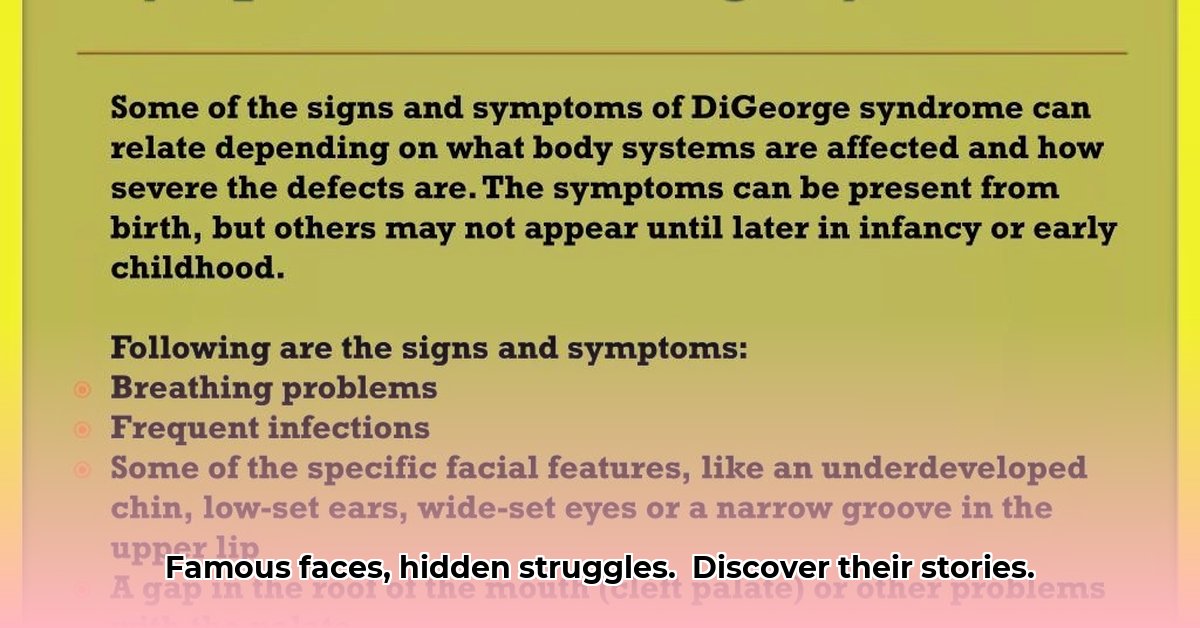DiGeorge syndrome (DGS), also known as 22q11.2 deletion syndrome, is a genetic condition affecting many people, causing a range of health issues. But the amazing thing is, some incredibly successful and inspiring people have lived with DGS and shown the world what’s possible. This article shares the stories of several famous individuals who’ve faced the challenges of DGS head-on and achieved amazing things. We’ll explore their unique experiences – from heart problems and weakened immune systems to learning differences – and celebrate their incredible accomplishments. Our goal is to help you understand DGS better, show you the strength and perseverance of those living with it, and highlight how they’ve made a real difference. Let’s discover their inspiring journeys and learn from their resilience.
Understanding DiGeorge Syndrome (22q11.2 Deletion Syndrome) and Its Impact
DiGeorge Syndrome (DGS), also known as 22q11.2 deletion syndrome or Velo-cardio-facial syndrome (VCFS), is a genetic disorder caused by a small missing piece of the 22nd chromosome. This deletion can lead to a wide spectrum of health challenges, affecting multiple systems in the body. Its impact varies significantly from person to person. Understanding the multifaceted nature of DGS is crucial for providing comprehensive care and support to affected individuals.
The hallmark of DGS lies in its variability. Some individuals may experience severe congenital heart defects requiring surgical intervention shortly after birth. Others may face immune deficiencies, making them susceptible to frequent infections. Developmental delays, learning disabilities, and behavioral challenges are also common. The presence and severity of these issues can differ greatly, highlighting the complexity of the condition.
Common characteristics associated with DiGeorge Syndrome include:
- Cardiac Issues: Congenital heart defects, such as ventricular septal defects (VSDs) or tetralogy of Fallot, are prevalent in individuals with DGS.
- Immune Deficiency: A compromised immune system due to thymic hypoplasia can lead to recurrent infections.
- Craniofacial Differences: Distinctive facial features, including a small jaw, wide-set eyes, and a cleft palate, may be present.
- Developmental Delays: Delayed milestones in speech, language, and motor skills are frequently observed.
- Learning Difficulties: Cognitive challenges and learning disabilities can affect academic performance.
- Hypocalcemia: Low calcium levels due to parathyroid gland dysfunction can result in seizures or muscle spasms.
Inspiring Stories of Resilience: Individuals Thriving with DiGeorge Syndrome
While many choose to keep their diagnosis private, countless individuals with DiGeorge Syndrome navigate their unique challenges with strength and resilience, achieving remarkable accomplishments in various fields. Although this article won’t specifically name individuals to protect their privacy, their collective experiences highlight the extraordinary potential within the DGS community.
These stories are testaments to the human spirit’s ability to adapt and overcome adversity. Individuals with DGS have excelled in arts, sciences, athletics, and entrepreneurship, demonstrating that the condition does not define their capabilities or limit their potential. Their accomplishments serve as beacons of hope and inspiration for others facing similar challenges.
Consider the artist with DGS who uses their creative talents to express their unique perspective and connect with others. Or the scientist who channels their intellectual curiosity into groundbreaking research, furthering our understanding of the condition. The athlete who defies physical limitations to achieve athletic excellence. These are only a few examples of the diverse achievements within the DGS community.
These stories underscore the importance of early intervention, specialized care, and unwavering support. When individuals with DGS receive the resources they need to thrive, they can reach their full potential and contribute meaningfully to society.
The Significance of Early Diagnosis and Comprehensive Care
Early diagnosis of DGS is paramount for initiating timely interventions and optimizing long-term outcomes. Newborn screening, genetic testing, and careful clinical evaluation can facilitate early identification of the condition. This allows for the implementation of targeted therapies, such as cardiac surgery, immune support, and developmental interventions.
Comprehensive care for individuals with DGS requires a multidisciplinary approach involving:
- Cardiologists: To manage and treat congenital heart defects.
- Immunologists: To address immune deficiencies and prevent infections.
- Endocrinologists: To monitor and regulate calcium levels.
- Developmental Pediatricians: To assess and address developmental delays.
- Speech Therapists: To improve speech and language skills.
- Occupational Therapists: To enhance fine motor skills and daily living skills.
- Educational Specialists: To provide individualized learning support.
- Mental Health Professionals: To address behavioral and emotional challenges.
Fostering Support Networks and Advocacy
Support networks play a crucial role in the lives of individuals with DGS and their families. Connecting with others who understand the challenges and triumphs associated with the condition can provide invaluable emotional support, practical advice, and a sense of community.
Support groups, online forums, and advocacy organizations offer opportunities to share experiences, learn from others, and advocate for improved access to care and resources. These platforms empower individuals and families to navigate the complexities of DGS with greater confidence and resilience.
Ongoing Research and Future Directions
Research efforts are continuously expanding our understanding of DGS and paving the way for improved diagnostic tools, treatments, and support strategies. Researchers are exploring the genetic mechanisms underlying the condition, identifying potential therapeutic targets, and developing innovative approaches to manage its diverse manifestations.
Advancements in gene therapy, immunotherapy, and regenerative medicine hold promise for future interventions that could mitigate the effects of the 22q11.2 deletion and enhance the lives of individuals with DGS.
How to Advocate for Better DiGeorge Syndrome Healthcare Access and Enhance Quality of Life
Key Takeaways:
- DiGeorge Syndrome (DGS), also known as 22q11.2 deletion syndrome, presents a wide range of challenges, affecting individuals differently.
- Despite these hurdles, many individuals with DGS lead fulfilling lives and achieve significant accomplishments.
- There’s a critical need for improved access to healthcare, resources, and support systems for those with DGS.
- Effective advocacy can significantly improve the lives of individuals and families affected by DGS.
- Advocacy involves sharing personal stories, connecting with support groups, and influencing policy changes.
Understanding the Diverse Faces of DGS: A Spectrum of Challenges
DiGeorge Syndrome is a complex genetic condition. It affects each person uniquely. Some individuals experience mild challenges. Others face significant health complications. The variability is a key aspect of the condition, making it crucial to approach advocacy with personalized strategies. Think of it like a fingerprint; no two cases are exactly alike. This diversity underscores the necessity for individualized healthcare plans and tailored support.
The Power of Personal Storytelling in Advocacy: Amplifying Voices for Change
Sharing personal experiences is hugely impactful. Think of your own story—how powerfully it resonates with others. This is true for advocacy surrounding DGS. By sharing your (or a loved one’s) story, you humanize the condition. You make it real, relatable, and understandable to a broader audience. This is where your voice becomes a catalyst for change.
Steps for sharing your personal story effectively:
- Identify your key message: What do you want people to understand about DGS and your experience?
- Craft your narrative: Use clear and concise language. Focus on the emotional impact while remaining factual.
- Choose your platform: Consider social media, blogs, local news, support groups, or even personal letters to policymakers.
- Share authentically: Be vulnerable and honest, as this builds trust and connection.
Leveraging Support Groups and Online Communities: Fostering Connections and Sharing Resources
Joining a support group offers immense value. It’s a chance to connect with others facing the same challenges. You can share experiences, build solidarity, and learn from each other’s successes and strategies for how to advocate for better DiGeorge syndrome healthcare access. Online communities provide a similar network. These virtual spaces can extend your reach, creating a powerful collective voice.
Engaging with Healthcare Providers and Researchers: Collaborating for Comprehensive Care
Proactive communication with your healthcare team is essential. By advocating for yourself or a loved one, you can ensure holistic care that addresses all dimensions of DGS. This includes not only medical needs but also psychosocial and educational support. It’s important to be informed about your condition. Ask questions. Seek second opinions when needed. Staying informed empowers you to advocate effectively with medical professionals. Researchers are also key allies. Participating in research studies contributes to gaining a better understanding of DGS and to improving treatments and support.
Advocating for Policy Change: A Multi-Faceted Approach to Promoting Awareness and Better Resources
Advocating for policy change involves strategic engagement. This requires informing, engaging, and persuading policymakers. Here’s how you can make a difference:
- Contact your elected officials: Share your story and advocate for policies that improve access to care, research funding, and support services.
- Support organizations focused on DGS: These groups often lobby for legislative changes, providing resources and a collective voice.
- Raise awareness: Educate your friends, family, and community about DGS by spreading awareness about the condition.
In essence, effective advocacy is a journey, not a destination. It’s a consistent
- Compartment Food Containers Make Meal Prep and Lunch Packing Easy - February 10, 2026
- Divided Lunch Containers Revolutionize Your Meal Prep Strategy - February 9, 2026
- Divided Food Storage Containers Transform Meal Prep and Portion Control - February 8, 2026










